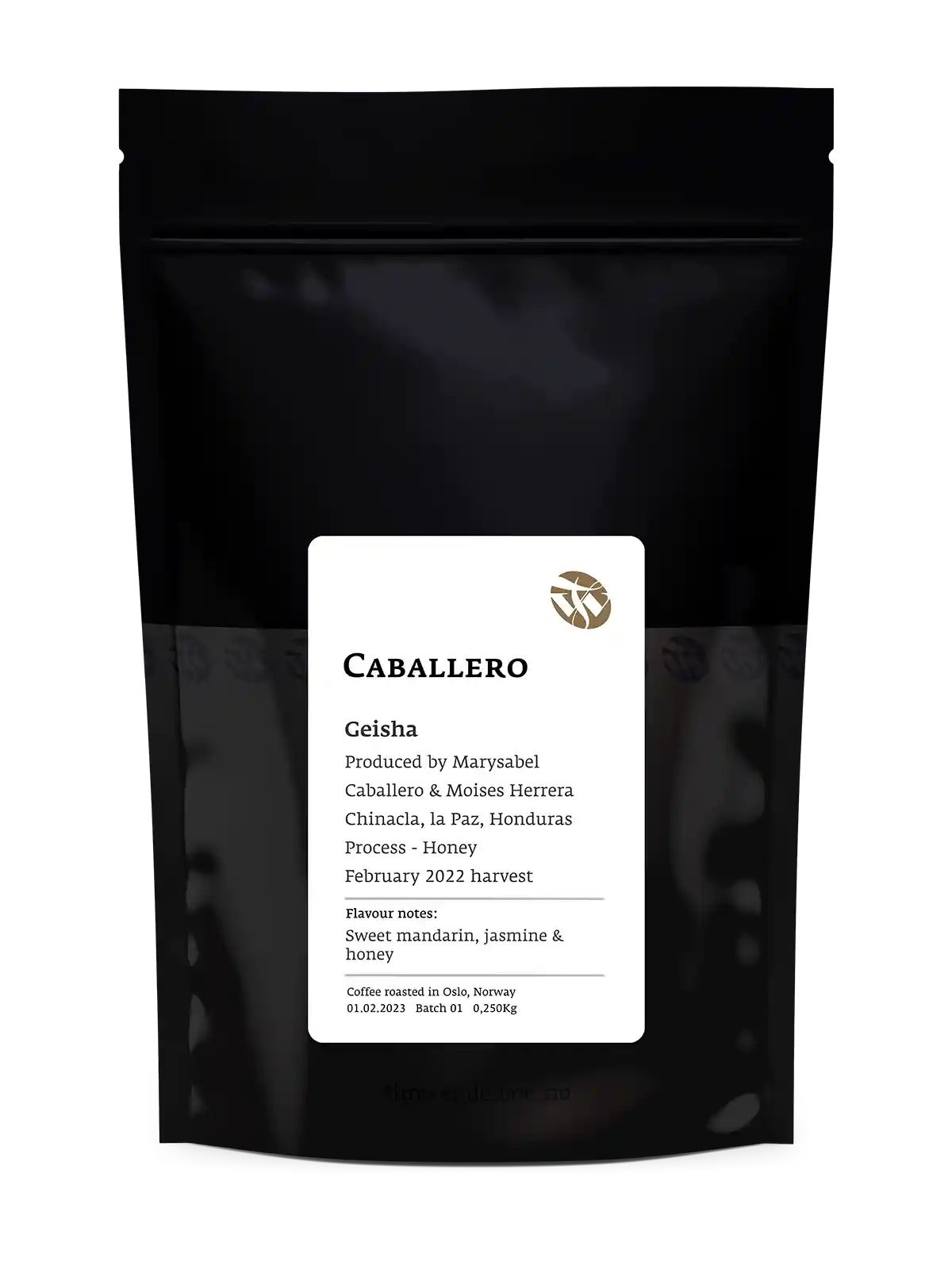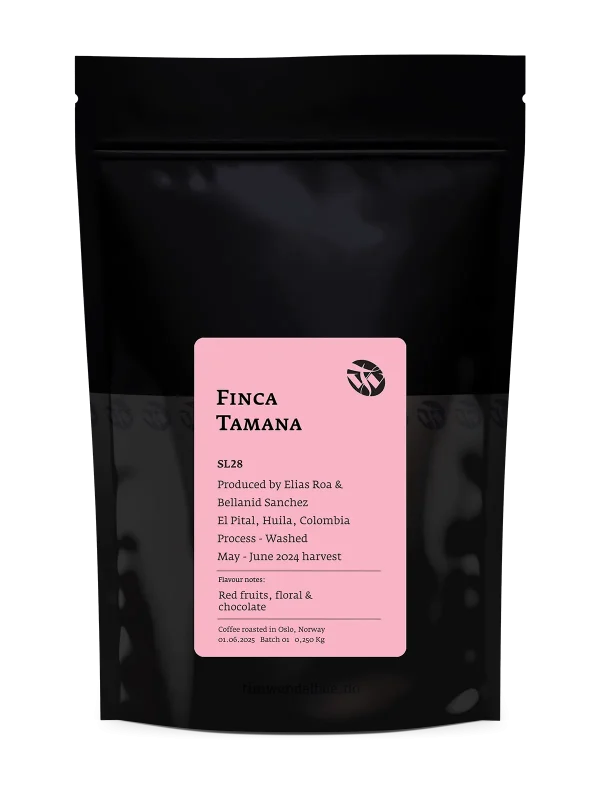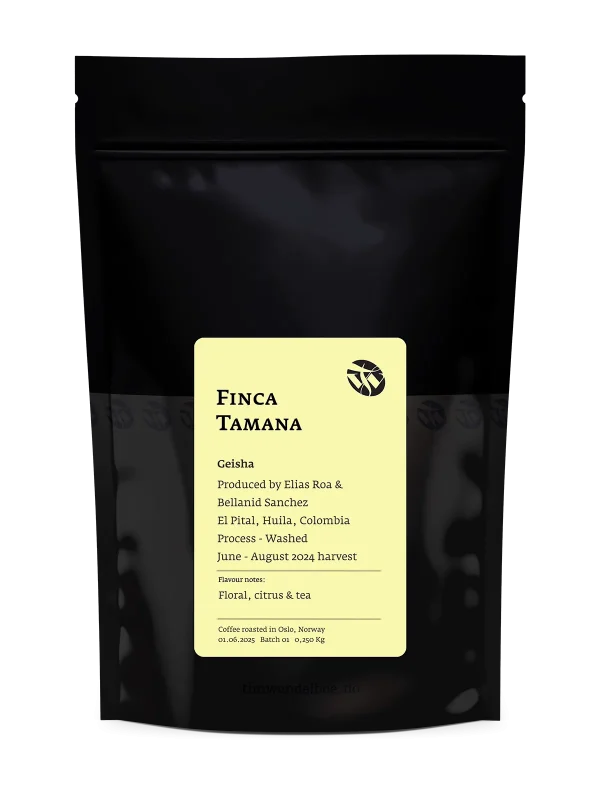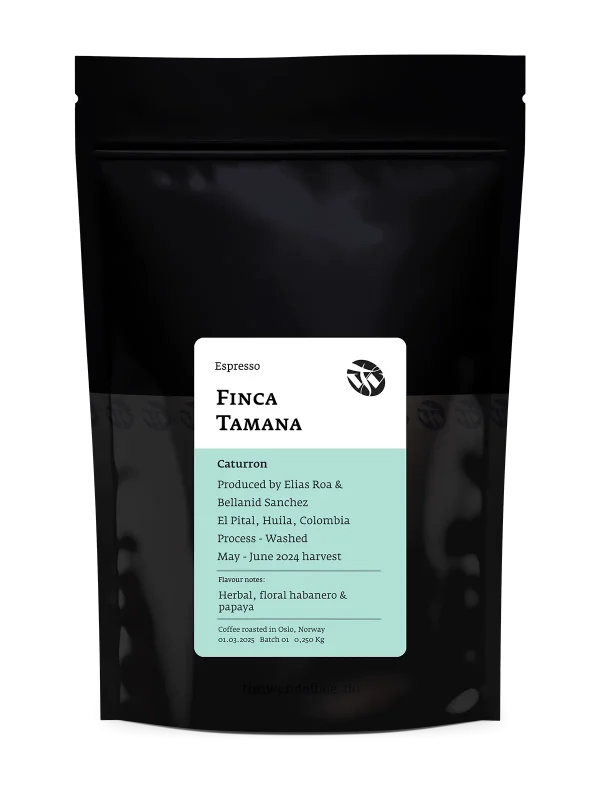| Cultivar | Geisha |
|---|---|
| Flavour Notes | Sweet mandarin, jasmine & honey |
| Producer | Marysabel Caballero & Moises Herrera |
| Country | Honduras |
| Region | Chinacla, La Paz |
| Process | Honey |
| Harvest | February 2022 |
| Roast Profile | Light Roast |
| Bag Size | 250g |
| Contents | Whole Coffee Beans |
Caballero Geisha Honey
kr340.00
Expect expressive sweet mandarin flavours with floral notes and a herbal twist from this award winning Geisha coffee.
Out of stock
Additional information
Tim's Notes
Honey process is where the coffee cherries are de-pulped and the parchment coffee is taken directly to be dried on raised drying beds with the mucilage still on the parchment. It is sort of a process in between a natural processed coffee (coffee cherries are dried with the parchment coffee inside) and a washed coffee (cherries are de-pulped and the mucilage is removed from the parchment coffee either through fermentation and washing or with a mechanical mucilage remover before it is dried.)
Normally we are not the biggest fan of this way of processing because when it is not done with special care you tend to get a slightly more rough cup with off-flavours from uncontrolled fermentation during drying. However, Moises and Marysabel have really refined the way they honey process their Geisha coffees which results in very vibrant and clean coffees with more intensity of flavours than their washed Geisha coffees . Expect an intense mandarin flavour with floral notes and a herbal finish.
Please note that when brewing this coffee with a filter method like V60, Kalita or Wilfa, the drawdown time (time for the water to pass through the coffee) can be a bit longer than what you are used to. A big mistake is to then grind a lot coarser as this will make the coffee taste thin, sour and bitter.
For best results make sure your brew water is as hot as possible, straight from the boil from your kettle. I also recommend not stirring a lot in the slurry as this makes the fine particles fall down faster and clog up the filter. Also make sure you grind the coffee like you would with the other coffees we are sending out or even better - slightly finer. Good luck and hope you will enjoy this coffee.
Normally we are not the biggest fan of this way of processing because when it is not done with special care you tend to get a slightly more rough cup with off-flavours from uncontrolled fermentation during drying. However, Moises and Marysabel have really refined the way they honey process their Geisha coffees which results in very vibrant and clean coffees with more intensity of flavours than their washed Geisha coffees . Expect an intense mandarin flavour with floral notes and a herbal finish.
Please note that when brewing this coffee with a filter method like V60, Kalita or Wilfa, the drawdown time (time for the water to pass through the coffee) can be a bit longer than what you are used to. A big mistake is to then grind a lot coarser as this will make the coffee taste thin, sour and bitter.
For best results make sure your brew water is as hot as possible, straight from the boil from your kettle. I also recommend not stirring a lot in the slurry as this makes the fine particles fall down faster and clog up the filter. Also make sure you grind the coffee like you would with the other coffees we are sending out or even better - slightly finer. Good luck and hope you will enjoy this coffee.
Cultivar
About The Geisha Cultivar
The Geisha cultivar is famous for its floral and citric cup profile. This award winning Geisha coffee from the Caballeros is no exception. Unlike the Panamanian geishas which typically has a light bodied cup, these Honduran grown Geisha coffee beans have a heavier mouthfeel, slight lower intensity of acidity ad a subtle herbal finish.Process
Caballero Production Process
Picking and sorting
Ripe cherries are hand picked by local pickers. The pickers are paid extra to sort ripe cherries from the unripe while they are picking. Sorting is done by simply putting the cherries in separate bags.Depupling, fermenting & washing
The coffee cherries are de-pulped in the afternoon. The parchment coffee is taken directly to the driers with the mucilage layer still left on the parchment coffee.
Drying
The coffees we buy from Marysabel and Moises are all dried slowly on raised beds covered with shade nets. These beds are set up by their house in Marcala where the climate is drier than at the wet mill which is located higher up in the mountains. During drying the coffees are raked throughout the day to ensure even drying. At night it gets covered to prevent condensation and the risk of the coffee gaining moisture in the drying process. Once the coffees are dried, they are stored in air tight grain pro bags before the they get milled and packed in vacuum packs and shipped to Norway.
Shipping
For our Norwegian customers, we offer three shipping options:
- Pakke i Postkassen - With Pakke i Postkassen, tracking is provided, and delivery is estimated within 2-3 business days.
- Pakke til hentested - The parcel can be collected from a Post in Store, Post Office, parcel locker, or parcel box. This option includes tracking, with delivery expected within 1-5 business days.
- Norwegian Post, No Tracking (Brevpost) - This option does not offer tracking. Delivery is estimated within 2-5 business days.
How To Brew
Filter
We strongly recommend using the correct measurements and brewing techniques when you brew our coffees. Use a digital scale both to measure water and coffee in order to get consistent results, and we recommend using between 60 to 70 grams of coffee per litre (1000g) of water, depending on the brewing method, water quality and coffee used.
Espresso
We strongly recommend using VST filter baskets. Both the 18g, 20g and the 22g basket is great for our coffee. The VST filters makes it a lot easier to extract the espresso properly which gives a lot more sweetness in the cup. They are also more or less identical to each other which makes it easy to be more consistent when brewing on several groups at the same time. You can buy the filters on our webshop, just make sure they fit your machine (ours fits all La Marzocco machines and machines with 58mm filter baskets). With the VST 18g filter basket, we recommend the following brewing parameters: 18-19g freshly-ground coffee, 25-35s brewing time, 35-38g of final brew liquid in the cup, 93°C-94°C brew water temperature.
We strongly recommend using the correct measurements and brewing techniques when you brew our coffees. Use a digital scale both to measure water and coffee in order to get consistent results, and we recommend using between 60 to 70 grams of coffee per litre (1000g) of water, depending on the brewing method, water quality and coffee used.
Espresso
We strongly recommend using VST filter baskets. Both the 18g, 20g and the 22g basket is great for our coffee. The VST filters makes it a lot easier to extract the espresso properly which gives a lot more sweetness in the cup. They are also more or less identical to each other which makes it easy to be more consistent when brewing on several groups at the same time. You can buy the filters on our webshop, just make sure they fit your machine (ours fits all La Marzocco machines and machines with 58mm filter baskets). With the VST 18g filter basket, we recommend the following brewing parameters: 18-19g freshly-ground coffee, 25-35s brewing time, 35-38g of final brew liquid in the cup, 93°C-94°C brew water temperature.
The Caballeros
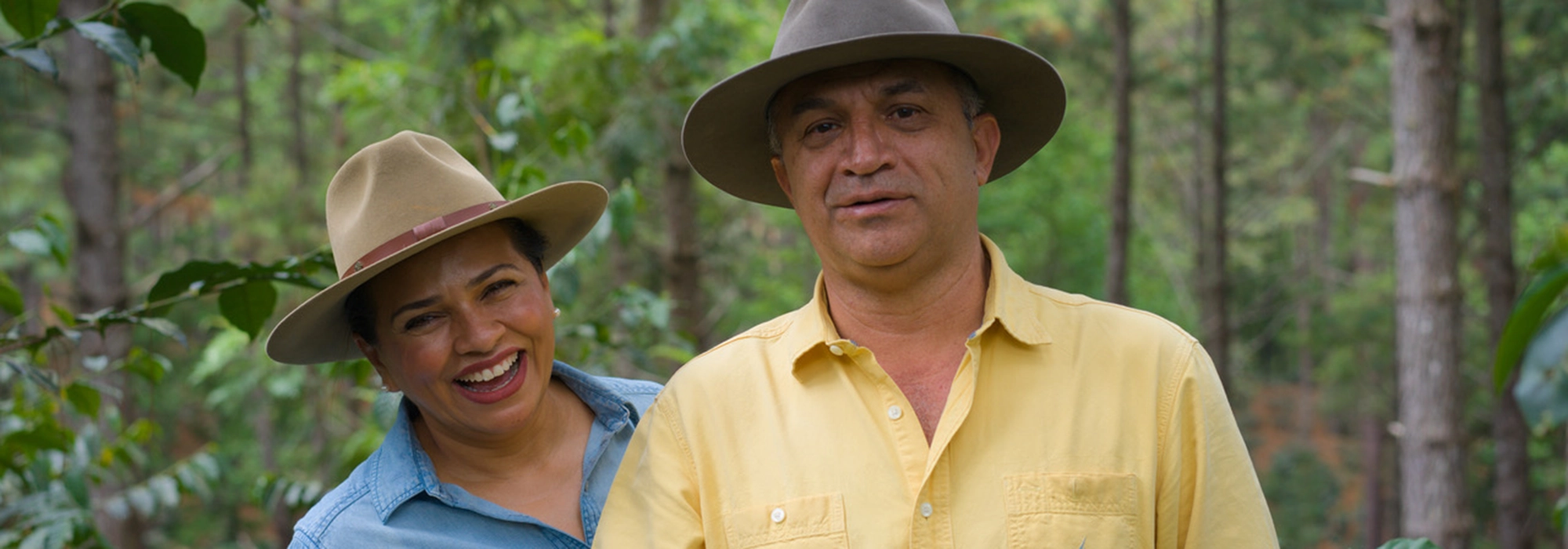
Marysabel Caballero is 3rd generation coffee farmer and together with her husband Moises Herrera they now own over 150 hectares of land planted with coffee near the town Marcala, Honduras. Marysabel’s father don Fabio Caballero is by many regarded as one of the pioneers among high quality coffee producers in Honduras. Together the family run a big wet mill where all of their coffees are processed and dried. Both Fabio, Moises and Marysabel have consistently been producing some of the best coffees Honduras has to offer. For over a decade they have been winning many top places in the Honduras Cup of Excellence. In 2016 and 2018 they managed to win 1st place with their Geisha coffees, but their first recognition was in the first Cup of Excellence competition in Honduras in 2004 when they won 2nd to 5th place with their Catuaí coffees.
Learn More About The Caballeros
Transparency
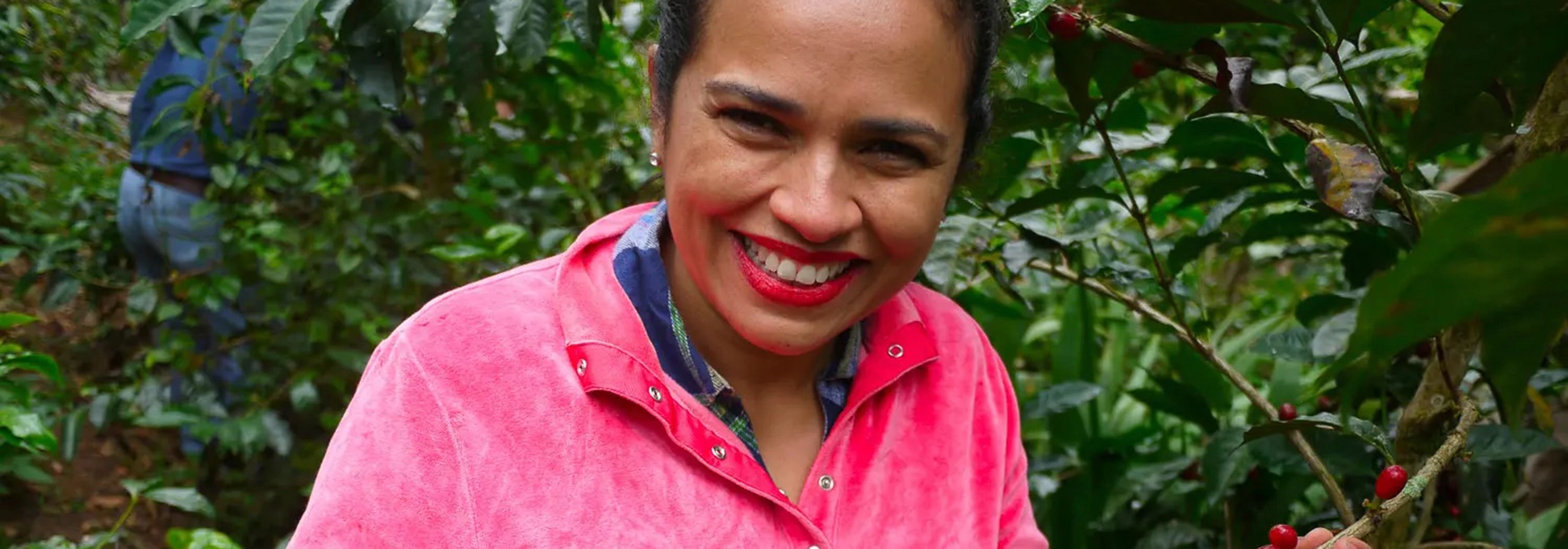
We buy coffee directly from Marysabel Caballero and Moises Herrera, the farmers. They mill and pack their own coffee. Boncafe, the exporter, provides logistical service and the coffee is imported by ourselves directly to Norway. We have been buying coffee from the Caballeros every year since 2009 and we will continue to do so in future years.
Learn More About Transparency

